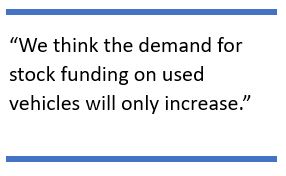Darren Mornin, NextGear Capital managing director, talks to AM about some of the biggest myths around stock funding and how the business is working with retailers to expand their businesses in AM's latest '5 Minutes With...' executive interviews.
How has the business grown and what are your expectations for 2023?
Since I joined in January this year we have had a good first half so far. Revenue is up 29%, which has been helped by increased rates to some degree. Profits are up by 45% and that’s a healthy number for us. But importantly, we haven’t seen the economic decline in terms of failures in the economic climate. Dealers have had a healthy first half of the year and we haven’t seen the level of distress in the market that might be expected.
What are some of the biggest myths around stocking funding?
The typical one around stock funding is that it’s an expensive source of capital, but it’s all relative. We have over 1,700 dealers on our books and they think we represent good value. The fact is the cost of stock funding is not as much as you might think and the one thing you should keep in mind is that it’s all relative. We can help dealers replace sold vehicles faster, evolve their stock profile or simply stock more, creating the opportunity for additional profit without compromising their cash flow. There’s no tie-in and there are no restrictions on where vehicles are sourced from.
The other is that stock funding is for dealers that are in financial distress. This is not a sub-prime product. We have such a broad church of customers, so it’s not just for a specific type of smaller independent used car dealer. Dealers understand that when they fund a vehicle that there’s a cost associated with that, but they can build enough margin into the whole process to make it pay.
What’s the typical profile of businesses that are working with Next Gear Capital?
On one end of the spectrum we’re very supportive of new enterprises. This might be businesses that aren’t cash rich but they want to grow. They have to meet a certain level of credentials to work with us, but we are far more lenient in our approach and risk appetite for smaller independent dealers. When these businesses grow, we can then extend our funding lines as the company gets bigger and needs more support.
On the opposite end of the spectrum, the bigger independents want to use their cash for other areas like their marketing budgets, their premises or refurbishments. They’re coming to us to take the hassle out of funding and putting vehicles on their forecourts. All these businesses share similar characteristics. They all want to grow and once a customer is on our books, we work closely with them to help them expand and increase forecourt volumes.
What’s the split in customers between independents and franchised dealers?
 Around 10% of the volume is through franchised dealers and about 20% of the funding value is through that sector too, but the rest is through independent dealers. The scale of those independents can differ greatly from £50,000 to multi million pounds of funding. We also offer a product called High Line to fund prestige and expensive vehicles. We’ve seen some success with that on things like Lamborghinis and other supercars, particularly across the last couple of years where used vehicle values have been rising.
Around 10% of the volume is through franchised dealers and about 20% of the funding value is through that sector too, but the rest is through independent dealers. The scale of those independents can differ greatly from £50,000 to multi million pounds of funding. We also offer a product called High Line to fund prestige and expensive vehicles. We’ve seen some success with that on things like Lamborghinis and other supercars, particularly across the last couple of years where used vehicle values have been rising.
What makes NextGear Capital different from other stocking lenders?
We fund the full value of the vehicle and the fees. A lot of our competition will only fund up to a certain value of the vehicle and don’t fund the auction fees or delivery costs. There are no restrictions on where vehicles are sourced from with us, as long as we’re comfortable that the vehicle price is a fair wholesale value. Dealers only pay for what they use, so they can use none of their funding line one month, 10% another and then all of it in another month. It’s very flexible.
What are the major challenges that customers are discussing with you right now?
The cost of parts, refurbishment and actually getting the technicians to get vehicles retail-ready at the right cost is certainly a big challenge. Sourcing good quality stock is another one.
We’re also hearing from our customers that attracting and retaining sales staff for used vehicles is getting more difficult too. The industry knows it needs to adapt and I think it’s still a struggle to attract millennials or Gen Z into the industry, particularly with working weekends. Dealers are rethinking their business models and how they incentivise sales people.
What’s the way forward with solving that recruitment problem?
Just don’t pigeon-hole people around who can do a sales role. You can be more flexible around who the right fit is in the job, but also on the flexibility of hours too. I am seeing positive moves from dealers to create a more diverse mix of sales people within dealerships.
With the agency model removing the need for stocking costs on new cars, how will this change the dynamics around funding?
I think it can only be an opportunity for NextGear Capital. We’re in the background and ready. We think the demand for stock funding on used vehicles will only increase. Car manufacturers are doing things differently when it comes to agency and so we’re not overly concerned about it in terms of how it might negatively impact our business. Franchised dealers are looking for frictionless ways of sourcing vehicles.
Regardless of the agency model, we’re seeing some of the bigger players that aren’t short of funds still working with us because they want a slicker way of sourcing vehicles without the administration and back office function headaches.





















Login to comment
Comments
No comments have been made yet.